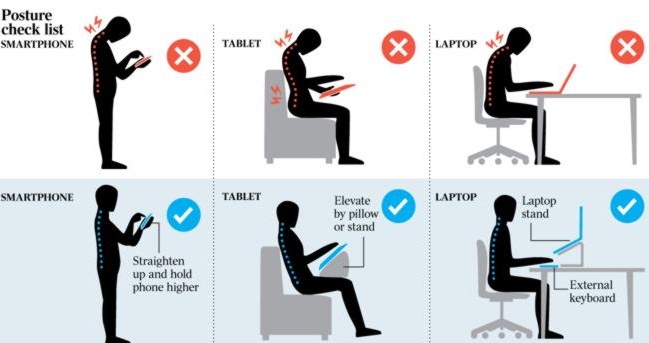Your posture, good or bad, directly affects your health. Bad posture has its attendant health problems which include chronic back and waist pain, neck pain, headache, tingling sensation in the limbs and fatigue. Postural imbalance also has its mental and psychological effects as well. It affects your self-esteem and confidence. To improve your posture, you have to be aware of your posture at all times. Pay close attention to how you sit at your desk or in your car, how you sleep in bed and how you stand in public places.
SITTING POSTURE: The height of your chair should be positioned such that your arms are parallel to the ground when placed on your desk. Get a foot rest if your feet are not touching the ground after this adjustment. Ensure your ankles and your knees are at right angles. Sit in the chair such that your hips are drawn up properly. Your shoulders should be rolled back and your upper back slightly tilted and resting on the back rest, thereby putting its weight off your waist and lower back. When you need to use the keyboard, draw your chair close enough to the desk such that you still maintain this posture and don’t have to bend forward. Also remember: don’t stare at the screen for more than fifteen minutes at a time and get up to walk around at least once every half-hour.
STANDING POSTURE: Stand erect, stand tall. Ensure that your ears, shoulders, hip, knees and ankles are on the same vertical line. Spread your shoulders; avoid arching your back or pushing out your belly. Stand with your legs slightly apart to accommodate the width of your hips. Let your hands hang naturally by your sides. It is good to primarily bear your weight on the balls of your feet but if you will be standing for a long time, shift your weight from the toes to your heels or from one foot to another at regular intervals. As much as you can, avoid wearing high-heeled shoes.
SLEEPING POSTURE: Find the mattress that is right for you. While a firm mattress is generally recommended, some people find that softer mattresses reduce their back pain. Your comfort is important. Sleep with at least 2 pillows. If you are sleeping on your side, place a pillow between your legs. If you are sleeping on your back, keep a pillow under your knees. Use a head pillow that is not too high or low for you. It should support your neck such that it will be well aligned with your body. Avoid sleeping on your stomach.

